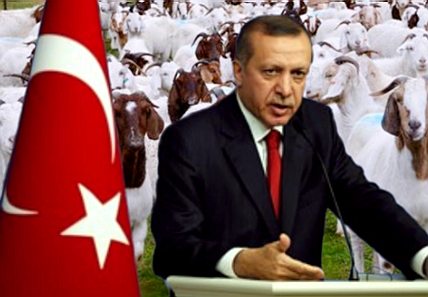
Last spring a comedian named Jan Böhmermann recited a satirical poem on German television that made fun of the proclivities of Turkish President Recep Tayyip Erdogan, who was alleged to have a predilection for intimate relations with a certain species of farm animals. Mr. Erdogan took exception to the characterization, and demanded that the German government prosecute the vile satirist. Chancellor Merkel complied with his request, and authorized a criminal investigation.
The case against Mr. Böhmermann highlighted Germany’s atavistic lèse-majesté law. Now, almost a year later, the Grand Coalition that governs the country has abolished the law, effective January 1, 2018. In other words, not soon enough to prevent Donald Trump from demanding the prosecution of Josef “Murder in the White House” Joffe. I doubt Mr. Trump would concern himself with such trivialities, but the option is still available to him, should he be so inclined…
Many thanks to Ava Lon for translating this article from Der Spiegel:
Paragraph 103
Cabinet will not abolish lèse-majesté until 2018
The Böhmermann case caused strong criticism of the lèse-majesté clause. Now the Grand Coalition has launched the abolition of the law.
January 25, 2017
On one point the Grand Coalition agreed: the controversial clause on Lèse-Majesté has to be abolished. The only disagreement was about the time — the SPD wanted to delete paragraph 103 immediately from the penal code, the Union [CDU and CSU] only at the beginning of 2018. Angela Merkel has now prevailed on this question. This is the result of a draft bill, which the Cabinet adopted on Wednesday.
Accordingly, the paragraph, which punishes an offense against a foreign head of state, will be abolished on January 1, 2018. Parliament still has to agree. In December the Federal Council had already demanded the deletion of paragraph 103 as well as the related paragraph 104a.
Justice Minister Heiko Maas called the law obsolete and superfluous. “The idea of a” defamation of majesty “comes from an era long past, it no longer fits into our criminal law,” said the SPD politician.
An insult to heads of state continues to be punishable even after the abolition of the paragraph — “but not more or less than that of any other person,” said Maas. The main difference lies in the sentence: Lèse-Majesté might result in up to three years of imprisonment or a fine, with ordinary insults of up to one year in prison or a fine.
It started with the case of the satirist and ZDF moderator Jan Böhmermann. He had attacked Turkish President Recep Tayyip Erdogan in a poem. Erdogan then pressed charges, insisting on the prosecution of Böhmermann, which was also approved by Chancellor Merkel over the opposition of the SPD. The public prosecutor’s office subsequently investigated Böhmermann on the grounds of, among other things, the suspicion of insulting a foreign head of state. The procedure was discontinued in the autumn of last year.

That’s quite an impressive harem Recep “Papa Goat” Erdogan has behind him in that photo. A different one for every night of the year!
There were reports recently of an Australian jihadi, Scott Cotton, now known as Mujahid Mujahid, who wants to return home with his daughter. This link takes you to a short version of the story and a picture of the happy father and kid: http://www.river949.com.au/news/67034-logan-man-turned-jihadist-pleads-to-come-home-from-syria
Of course the local Muslim’s are going to look after one of their own, which shows what side they are on. As for that child this idiot fathered why do we have to pick up the tab for another Muslim?
Why do we have to pick up the tab irregardless of religious orientation?
We will always be required to pick that tab up so long as federal governments remain committed to their ‘educational’ requirements.
Time we cut that one loose.
Impressive. The writing on the wall couldn’t be clearer. Still some won’t see it.
There is a huge difference between calling for a politician’s murder and simply insulting him. I think there are other laws Trump could use against Joffe even when this stupid Lèse-Majesté law is abolished.